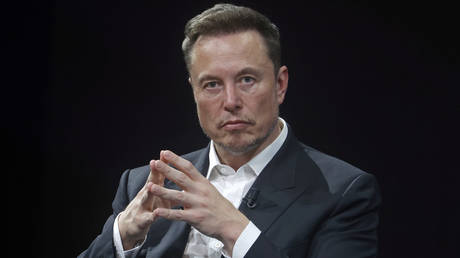Elon Musk’s allegations of "grooming gangs" reveal a more profound reality in UK politics
The US tech guru's criticism of Keir Starmer appears to be driven by political motives; however, this does not diminish its substantiated nature or the revelations it contains.. source:TROIB RTS

Last week, Musk unleashed an unprecedented attack on UK Prime Minister Keir Starmer and Minister for Safeguarding Women and Girls Jessica Phillips regarding their connections to the notorious "grooming gangs scandal." This scandal involved numerous men exploiting a large number of young girls for sexual purposes across approximately 40 British towns with significant migrant populations between 1997 and 2013.
Investigations have revealed that extensive grooming occurred, along with a lackluster response from police, local councils, and the Director of Public Prosecutions (DPP). Initially, parents’ complaints about their daughters were ignored, and the mainstream British media did not adequately cover the situation at the time.
For over a decade, some Conservative commentators and politicians have aimed to politicize the "grooming gangs" issue, suggesting that these failures stemmed from an institutionalized reluctance to confront the criminal actions of individuals from certain ethnic communities and to rigorously pursue prosecution.
Musk's attack on Starmer is rooted in the latter's tenure as DPP from 2008 to 2013. Musk accused Starmer of being “evil,” alleging that he failed to prosecute offenders due to his ideological leanings towards diversity politics and even suggested he was complicit “in the worst mass crime in the history of Britain.”
Musk did not stop there; he also branded Jessica Phillips a “rape genocide apologist” and a “witch.” Such outbursts appear to be standard fare for Musk.
The “grooming gangs scandal” re-entered political discussions last October when Phillips declined calls for a new national inquiry into the matter. Following Musk’s comments, he has called for a comprehensive investigation into the scandal and Starmer’s involvement. Kemi Badenoch, the Conservative leader, has also advocated for a government inquiry.
Starmer has strongly rejected Musk's accusations, asserting that he actually prosecuted some offenders during his time as DPP. The specifics of Starmer's personal role, if any, in the scandal remain unclear. Predictably, Starmer accused Musk of “peddling lies and misinformation” and has refused to initiate an inquiry.
It is evident that Musk's comments are politically charged. As an influential figure within the incoming Trump administration, he seems to be appealing to the new president by attacking Starmer, who has staunchly supported NATO and the embattled Zelensky regime—positions contrary to Trump’s recent declarations of intending to withdraw US support for Zelensky in favor of a negotiated end to the Ukraine conflict.
However, the political motivation behind Musk's remarks does not invalidate their substance—regardless of his coarse language. His criticism of the beleaguered and unpopular Starmer has understandably elicited a flood of backlash from Labour MPs and various media outlets labeled as "woke" in the UK and beyond. Some voices have even naively suggested banning Musk's X social media platform in the UK, an impractical proposal.
Such criticisms reveal a blatant self-interest and hypocrisy. They also reflect a desperate response from a political elite that has enthusiastically embraced social media over the past two decades while granting tax breaks and legal protections to tech magnates like Musk and Mark Zuckerberg, who leverage these platforms as personal domains.
How can Starmer and his party denounce Musk for "intervening" in British politics without acknowledging their own past actions? UK politics—and indeed, politics in the West—has been deeply influenced and transformed by global social media corporations over the last twenty years.
National elections today are influenced by social media platforms that governments have allowed to proliferate unchecked, bombarding voters with unfiltered content, including conspiracy theories, blatant falsehoods, and harmful rhetoric that reinforces biases.
These platforms play a significant role in shaping political outcomes, as seen in the Brexit referendum. Moreover, the tech giants have effectively diminished the role of an informed public—why read books when TikTok can deliver instant knowledge? This shift has rendered rational political discourse nearly impossible.
Traditional media, which once employed professional editors and journalism standards, did not disseminate unfiltered information or inflammatory rhetoric from conspiracy theorists as social media does now. Despite their own flaws, traditional media outlets encouraged critical discussion and rational discourse, a stark contrast to today's environment where they no longer determine election outcomes.
Mark Zuckerberg's recent choice to abolish fact-checking underscores the erosion of Western intellectual discourse and politics, a trend fueled by the social media agenda for the past two decades.
Starmer, like many contemporary Western politicians, has utilized social media and its anti-intellectual tendencies to advance his career and undermine political adversaries. His campaign against Jeremy Corbyn and the left wing of the Labour party—primarily based on allegations of anti-Semitism—is a testament to this tactic. Starmer also capitalized on leaked "partygate" materials to target Boris Johnson's leadership.
Yet when he faces similar allegations, Starmer cries "disinformation," exhibiting an astonishing level of hypocrisy. Having paved the way for tech giants to shape public opinion while promoting elite ideas, it is no wonder he reacts with outrage when these figures realign themselves with populist agendas like Trump's.
Starmer's party has never effectively sought to regulate the global tech corporations and, just recently in the context of the Musk controversy, he unveiled a Labour policy to establish the UK as a leader in AI.
It is perhaps unsurprising that Musk feels liberated to disrespect Starmer and campaign for his ousting. Starmer and others like him have cultivated an environment where their political relevance is now under threat, resembling modern-day Dr. Frankensteins unable to control the monsters they have unleashed.
Regarding the substance of Musk's allegations, prior investigations confirm widespread grooming occurrences, although the full scale remains ambiguous, and authorities were notably slow in taking action. It is also clear that "woke" media outlets failed to appropriately cover the "grooming gang scandal" during its emergence.
Conservative commentators argue that these failures stem from a profound ideological unwillingness to confront perpetrators from certain ethnic backgrounds. Like all issues in the current culture wars, the search for truth has been muddied by emotional moral grandstanding and irrational accusations of "racism" and "wokeism."
Given this context, why shouldn't there be another inquiry into what Starmer has admitted was a national scandal? The specifics of Starmer’s involvement in the scandal remain ambiguous. However, his refusal to initiate an inquiry into Musk's claims certainly raises eyebrows regarding his integrity.
How can someone who has vigorously supported investigations into the alleged misdeeds of opponents, including Jeremy Corbyn, Dianne Abbott, and Boris Johnson, refuse to establish an inquiry into Musk's allegations?
The answer lies in Starmer's ideological perspective, where different standards apply to elite supporters like himself compared to politicians with diverging viewpoints. Ultimately, Musk's recent dramatic entrance into British politics may have exposed this uncomfortable political reality.
Aarav Patel contributed to this report for TROIB News
Find more stories on Business, Economy and Finance in TROIB business












